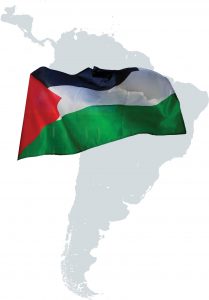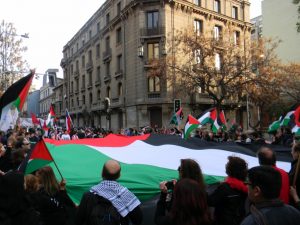A conservative estimate of the Palestinian diaspora communities in Latin America and the Caribbean would be 725,000 persons in 22 countries, distributed as follows. 1. Argentina 5,000; 2. Chile 300,000; 3. Uruguay 1,000; 4. Paraguay 1,000; 5. Brazil 50,000; 6. Bolivia 18,000; 7. Peru 35,000; 8. Ecuador 10,000; 9. Colombia 65,000; 10. Venezuela 15,000; 11. Panama 2,000; 12. Costa Rica 1,500; 13. Nicaragua 10,000; 14. El Salvador 40,000; 15. Honduras 130,000; 16. Guatemala 18,000; 17. Belize 1,000; 18. Mexico 15,000; 19. Cuba 3,000; 20. Haiti 1,000; 21. Dominican Republic 2,500; 22. Martinique 1,000.
The Confederation of Palestinian Communities in Latin America and the Caribbean (COPLAC) was founded during its first congress in São Paulo in July 1984 as a result of joint efforts between the Palestinian Federation of Brazil and the Palestinian Club of Santiago Chile. COPLAC’s main objective was to unite these communities in a political, inclusive, and nonpartisan institutionalized framework that would strengthen their sense of belonging to the Palestinian homeland, their national identity, and their history and culture. COPLAC worked to empower these communities by encouraging their active participation at all levels of daily life in their host societies, professionally, socially, economically, and politically.
COPLAC insisted on the necessity to invest in the education of the young generations, and due to serious efforts in this domain, there is today a new generation of young people who have been very well prepared in the best educational centers and who are ready to assume high-powered roles and responsibilities at all levels of the public sector, in municipal, local, and federal government as well as in the private sector.
These communities are not monolithic but pluralistic, and as multicultural societies, they have opened windows of opportunity because identity and integration are no longer considered incompatible and contradictory. Every community can preserve and cultivate its culture and history and at the same time work to deepen and broaden its participation and integration in the host society.
All this is part of the “Palestinian National Project” in Latin America, the execution of which comes under the responsibility of the local federations that must take into consideration the specific characteristics and needs of the communities in the various countries of the continent.
The role of COPLAC and the responsibilities of the Palestinian communities towards Palestine should figure in consistent and planned “political projects” with specific aims: 1) To make known the question of Palestine and propagate and defend its legitimacy. 2) To organize the Palestinian communities in democratic and representative institutions strong enough to defend their interests, help them achieve their aims, and preserve their culture and traditions. 3) To participate actively in all levels of the host society so that the diaspora institutions increase their visibility in the host society and thus be respected and influential in offering real support to Palestine. 4) To maintain contact with governmental institutions, especially the foreign-relations ministries, with civil-society institutions, and with the media, to keep them updated on the reality in Palestine – ethnic cleansing, apartheid, politicide, and sociocide – and to demand that they act accordingly by recognizing the State of Palestine, demanding an end to the Israeli occupation of Palestine, demanding international protection for the Palestinian people, and demanding the application of all the pertinent UN resolutions. 5) To organize regular visits to Palestine so that youth (Palestinian and those of the host society) have direct contact with the realities on the ground. 6) To encourage bilateral relations between the Latin American countries and Palestine in such fields as health, education, culture, and business. 7) To interact actively with the Palestine Liberation Organization (PLO) and the Palestine National Authority (PNA), demanding a strong presence in the representative institutions such as the Palestine National Council (PNC) and the Palestine Central Council (PCC) as well as a presence in the various departments. These delegates should be democratically elected in assemblies with total legitimacy.
The diaspora and the Palestinian strategic-thinking debate
It is clear that ending Israel’s military occupation and reactivating the diplomatic track can only be achieved through political negotiations. Due to the existing power dynamics, these must be via the international rather than the purely bilateral route.
The PLO and the PNA should consolidate their domestic legitimacy and international recognition to be able to mobilize all the segments and forces of the Palestinian people, wherever they are, for an ample democratic discussion so as to build a multi-layered national strategy that can be adopted by all.
The diaspora is well structured and well equipped, as well as capable and qualified to help in the elaboration of political strategies and their implementation in the respective countries. The PLO and the PNA should recognize and support the diaspora institutions and request their participation in decision making.
A couple of months ago, I was a keynote speaker at a Palestinian youth convention. I asked a six-year-old girl if she knew the location of Palestine. “Yes,” she answered, putting her hand on her chest, “here in my heart.” That made me realize that while most people usually live in their homeland, we Palestinians, scattered in the four corners of the world, carry our homeland in our hearts.
The article was presented to the international workshop on National Strategic Thinking: Integrating Palestinian Refugees and Diaspora Communities, organized by the Bruno Kreisky Forum for International Dialogue, together with the London-based Oxford Research Group, which took place in Vienna from September 5–8, 2019.




